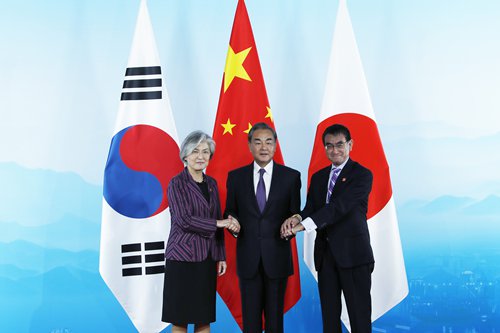New thinking needed for ROK-China-Japan trilateral cooperation
By Jaeho Hwang Source:Global Times Published: 2019/10/25 12:06:47

Chinese State Councilor and Foreign Minister Wang Yi (C) poses for a group photo with the Republic of Korea (ROK) Foreign Minister Kang Kyung-wha (L) and Japanese Foreign Minister Taro Kono in Beijing, capital of China, Aug 21, 2019. The ninth meeting of foreign ministers of China, Japan and the Republic of Korea (ROK) is held in China and Chinese State Councilor and Foreign Minister Wang Yi chaired the meeting.Photo: VCG
The trilateral relations between the South Korea, China and Japan are composed of three bilateral relationships, which have rarely been in positive shape at the same time. A total of 50 diplomats and experts from three countries met over the past weekend in Changsha, Hunan Province, China, with three different bilateral levels: relatively easy-going relations between China and Japan, recovering South Korea and China relations, and suffering South Korea and Japan relations. In the end, at least seven points and one conclusion could be derived from the 4th International Symposium on China-Japan-ROK Security Cooperation, organized by the China Institute for International Studies and the Trilateral Cooperation Secretariat.
First, the current US-led international order has been shaken up, and concerns have grown over the US leadership. Changes in the US leadership will inevitably affect US-China relations as well as foreign policy for the ROK, China, and Japan, though the extent might differ. The pressure from the US on its alliances is changing the nature of the relationship between the US and its allies, and the US' promotion of new security policies has alienated some of its allies.
Second, not only China's ability but also its willingness to contribute has grown. With the rise of China, the regional order in Northeast Asia is now undergoing structural changes. Currently, the Northeast Asian order is divided into a dual structure between the US and China in terms of economy and security. China is willing to show its positive and constructive image by expressing its 1) economic contribution through the Belt and Road Initiative, 2) diplomatic contribution through establishing a new type of international relations, and 3) military contribution through pursuing defense policies in line with a community of a shared future for mankind.
Third, the competitive aspects of the international order, whether at the global or regional level, are becoming more prominent. As protectionism expands due to the intensifying competition between the US and China, we are standing at a critical juncture regarding whether to maintain openness in the current order or not. As the US's Indo-Pacific Strategy, which came out as a response to the Belt and Road Initiative, focuses more on security and military issues, the pessimism about competition is surpassing the optimism over US-China relations.
Fourth, the significance of peace and stability on the Korean Peninsula is being emphasized again. Despite the continued sanctions, North Korea is sticking with its current denuclearization stance and the related countries have wide differences over the definition of complete denuclearization. In this sense, the future of the Korean Peninsula is not smooth. However, peace is the basic premise for denuclearization negotiations, and there is no disagreement that peace and stability will be positive in any case.
Fifth, signs of change are emerging in the Korean Peninsula. The North Korean issue is an example that shows cooperation between the US and China is still possible. Although there is a possibility of a new Cold War between the two countries, the uncertain leadership of the US, whether it is Trump's personal factor or the "America First" approach, will bring changes in the Korean Peninsula somehow. Meanwhile, there is now a wave of change on the Korean Peninsula, as controversy over the transfer of wartime operational control and the function of UN Command has not happened before.
Sixth, cooperation between the ROK, China and Japan can be tried in various areas, including security. There were various suggestions regarding cooperation from the participating scholars, such as preventing North Korea from making further provocations by cooperation not only in the cultural industry, but also with the new form of maritime cooperation, and cooperation on partial regional borders, as well as establishing a new regional security framework in Northeast Asia.
Seventh, we need a "new normal" in terms of trilateral relations. The three countries are historically and culturally very close and have formed love and hatred in numerous contexts. Even now, the three countries are still intertwined with territorial, historical and other pending issues. A new normal could put an end to the excessive expectations of each other among the three countries along with efforts "to seek truth based on concrete evidence." While minimizing the cost of conflict, the three countries should at least respect each other. It is necessary to manage and prevent conflict factors in advance.
In conclusion, many of the ROK, China and Japan meetings are held either bilaterally or within the international conferences with a number of countries participating. Therefore, such a meeting of new think tanks can play a role in establishing new international relations. Most of all, there was a consensus at the meeting on the need for new thinking and new approaches for cooperation between the ROK, China and Japan. To walk toward a better future, the three will have to establish a new trilateral relationship.
The author is Director of Global Security Cooperation Center at Seoul-based Hankuk University of Foreign Studies. opinion@globaltimes.com.cn
Posted in: VIEWPOINT,OTHER REGIONS